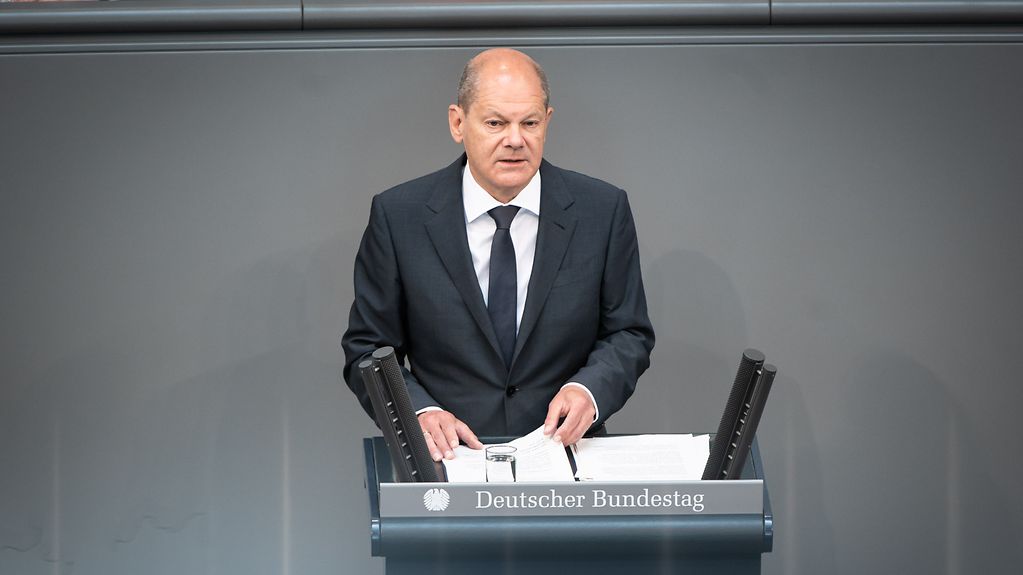Government statement by Federal Chancellor Scholz
“War in our immediate neighbourhood is, without doubt, the greatest challenge” that the European Union has had to cope with in the last few years, said Federal Chancellor Olaf Scholz in his government statement in the German Bundestag on Thursday. It was therefore all the more important to defend peace, he said.

Federal Chancellor Olaf Scholz once again promises support to Ukraine in his government statement.
Photo: Federal Government/Steins
“We have seen once again that, the greater the external pressure is, the more resolute and united are the European Union’s actions,” stressed Federal Chancellor Scholz with regard to the Russian attack on Ukraine in his government statement in the German Bundestag. He added that the European Union was a peace project and the greatest achievement of European unity was that a war between EU member states was still unimaginable.
“We all share the same goal: Russia must not win this war. Ukraine must survive,” said Scholz. As the largest member state, Germany bears a particular responsibility for the unity of the European Union, he said. For this reason, the Federal Chancellor will advocate a European response at the special meeting of heads of state and government in Brussels at the end of May.
“That’s why we are providing support to Ukraine – including military support”
The Federal Chancellor said he knew that virtually all citizens were united by their concern about peace – in Ukraine, but also at home. “Helping a brutally attacked country in its defence does not constitute escalation. Rather, it is a contribution towards repelling the attack – and thus ending the violence as quickly as possible,” said the Federal Chancellor. Putin first had to realise that he cannot break Ukraine’s defence before he would be willing to negotiate seriously about peace, he continued. “That’s why we are providing support to Ukraine – including military support.”
Proposals by European citizens to be quickly implemented
In the context of the Ukraine war, Federal Chancellor Olaf Scholz also urged further development of the European Union, saying that the turning point required us in Europe to think in the longer term. He wanted to take up the many good proposals which European citizens had presented within the Future Conference. These included a more people-orientated and efficient Union, more consistency in climate protection, progress in European defence, more social cooperation. “Much of this can now be quickly implemented,” but if the situation necessitated it, contractual changes should also be conceivable.
Securing and strengthening Germany’s defence capabilities
Germany’s defence capabilities must also be secured and strengthened, Scholz said.
To this end, the Federal Armed Forces required the special fund of 100 billion euros.
“The special fund guarantees the freedom and security of our country at this time,” the Federal Chancellor explained. This was also a clear message to friends and allies: “Yes, we are serious when we speak of the obligation to assist and of collective defence.” The request by Sweden and Finland to join NATO showed the value of this certainty.
EU solidarity with Ukraine
“Ukraine is part of our European family,” emphasised Federal Chancellor Scholz.
The EU heads of state and government will also discuss the solidarity fund at the extraordinary meeting of the European Council. Its purpose was “to eliminate destruction left behind by the war”. However, it was also about supporting the country in its “European path”. The Federal Chancellor added: “Emmanuel Macron is right to point out that the entry process is not a question of a few months or even years.”
In this context, he referred to the six Western Balkan countries which had been preparing for EU entry for years by means of intensive reforms. According to the Federal Chancellor, it was in the strategic interest of the EU for it to keep its promises to these countries. And it served “our own security, which cannot be had without a stable European Western Balkans region”. Federal Chancellor Scholz announced that he would reactivate the “Berlin Process” and travel to the region in June. To him, it is clear: “The Western Balkans belong in the European Union!”
Securing energy provision nationally and throughout Europe
Another topic which the heads of state and government will discuss at their special meeting is energy provision in the EU. Energy provision must be not only independent and secure but also affordable, the Federal Chancellor said. With a view to the price increase caused by Russia, he made it clear that “We will not abandon anyone!”
The Federal Chancellor cited the two relief packages as national measures. These comprise, among other things, the energy price lump sum of 300 euros, fuelling relief and the 9-euro ticket as an incentive to make greater use of local public transport.
At the European level, he said, the chief aim was to prevent bottlenecks in energy provision in individual member states – as the “requirement of European solidarity”. The current proposals by the European Commission “to accelerate the expansion of renewable energy, for more energy efficiency and for the industrial transformation” would therefore also be discussed at the summit.